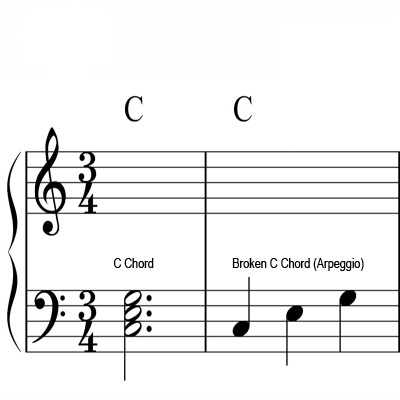What Are Chord Arpeggios
Chord arpeggios or arpeggios are the notes of a chord played one at a time. They are sometimes referred to as broken chords
When practicing chord arpeggios you normally start with breaking up a chord and playing the chord notes in order, for example, Root note, 3rd, 5th and\or 7th for a Major 7th Arpeggio
Note **If you are familiar with chord inversions they they root note may not always be the starting point**
Most arpeggios will start from the 3 notes that form a chord, it is possible to play more notes depending on the number of notes that make up the chord you are trying to play
When playing arpeggios in a improvised setting you do not need to play the notes in order
They can be played in any order much like the way you would use notes in a scale and in many ways they are similar with the following differences
- When we learn scales we learn a bunch of notes that fit over various chords in a certain key
- When we learn an arpeggio we learn a bunch of notes that fit over a particular chord
It is important an arpeggio is not confused with a scale. A scale is a series of notes played in a sequence instead of a series of notes that make up a chord
Why Chord Arpeggios Are Important
Although arpeggio technical excercises aren’t a favorite musical activity to do here is a list of reasons why you should do them
- They develop your awareness of tonality and knowledge of all the notes
- They help you develop fast agile fingers
- Arpeggio runs make up the bulk of what people perceive as difficult music therefore having an intimate knowledge of them is essential
- If you improvise they help you immensely as you’ll quickly be able to play notes of any chord without giving too much thought
- They teach you how to effectively move your fingers which is the foundation of music playing
- Arpeggios help develop finger strength
- Improves your coordination and dexterity
- Practising your arpeggios will develop your musical ear
- They help students develop a strong sense of rhythm, articulation and speed, which are all important for playing music
- Knowing arpeggios will boost your confidence
- Arpeggios will help with chord knowledge
- Practising arpegios will help you reach music mastery and help develop muscle memory
The good news is that you can still achieve all these great points by playing your favorite pieces and going through your method book exercises, however practising arpeggios does gives you a more targeted approach therefore you should incorporate arpeggios as part of your daily practice
They are also a good tool for improvising over certain genres like Jazz where there can be frequent key changes
Are Chord Arpeggios Really That Important
There is no doubt arpeggios are good for assisting with learning music theory and practicing technical exercises on your chosen instrument
However if you’re like me, you’d probably much rather take a piece of music with a specific technical difficulty and strengthen your technique that way
Interestingly, some famous musicians claim they’ve never performed arpeggios exercises as part of their routine
Now I’m not suggesting that you ignore arpeggios altogether as I practice them myself. My recommendation is to incorporate it as part of your daily practice (perhaps %10 of practice time) and to ensure you know why you’re doing them
You should definitely learn arpeggios but you don’t need to practice them for hours every day to become a good musician
